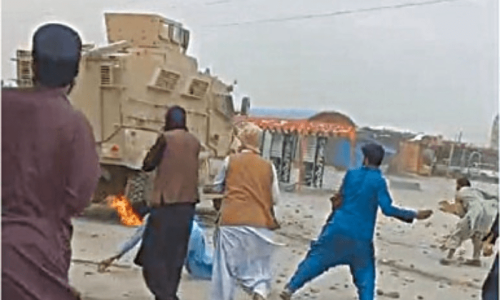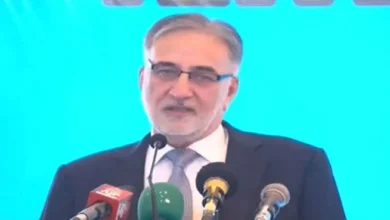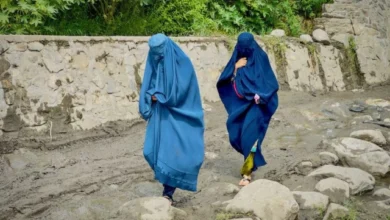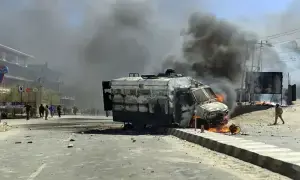40 injured as Chaman protests take violent turn

At least 40 people, including 17 security officials, were injured in Chaman on Thursday amid escalating tensions as protesters, incensed by the arrest of their leaders of a sit-in, launched attacks on government buildings and installations, demanding immediate releases.
The unrest spread across the border town, with protesters staging rallies and demonstrations, effectively shutting down the city.
The arrested leaders were part of a months-long sit-in in Chaman against the government’s decision to only allow those with valid passports and visas to cross the Chaman border crossing. Before, Pakistanis and Afghans would cross the border upon showing their respective identity cards.
Officials said clashes started when the protesters tried to block major roads, including the national highway linking Quetta with Kandahar, disrupting traffic with barricades.
However, the local administration, along with security forces, including police, Levies and personnel of Frontier Corps, lobbed tear gas shells to disperse the mob and restored traffic by removing hurdles from the highway.
During their march, the protesters also staged a demonstration in front of the Deputy Commissioner Office complex and hurled stones at the building and forcibly closed all shops at Mall Road and other business centres. They also beat some shopkeepers with sticks.
According to local officials, the demonstrators also disrupted communication systems and attempted to cut power supplies to the Frontier Corps (FC) fort.
They hurled stones at the FC headquarters in Chaman, prompting the security officials deployed in the area to fire blank shots and lob tear gas shells.
Shahid Rind, a spokesman for the Balochistan government, said the forces and local administration tried their best to disperse the protesters, but when they started attacking the forces, they responded and used rubber bullets.
“At least 17 security personnel were injured in clashes while a policeman received a bullet in his hand,” he confirmed, adding that some protesters were also injured.
Other sources said that over 20 protesters received rubber bullet injuries during the clashes and were shifted to the district hospital in Chaman. Six of them were shifted to Quetta for treatment.
“We have received 13 people who were hit by rubber bullets along with other injured,” Dr Rasheed of the district hospital said.
Official sources said that law enforcement agencies have arrested over four dozen protesters for pelting stones at the security forces and attacking government buildings.
“As many as 56 people were taken into custody from different areas of Chaman,” security officials told Dawn, adding that more security personnel were deployed in the border town.
Asghar Achakzai, a local journalist, told Dawn by phone from Chaman that the town resembled a battlefield during the clashes, with disrupted internet services for the past two days complicating reporting efforts.
However, by late evening, tribal elders and political leaders headed by Mufti Qasim and Muhammad Hasan mediated negotiations with Chaman Deputy Commissioner Athar Abbas Raja, after which the protesters dispersed and the situation became normal.
However, Molvi Abdul Manan, a protest leader, vowed to continue demonstrations “until the release of our seven leaders who were arrested by Levies the other day and shifted to Quetta Jail”. He demanded that all people arrested over the past two days be released immediately.
Govt to open Badini crossing
Meanwhile, the Balochistan government has decided to open the Badini border crossing at the Pakistan-Afghan border in the Qila Saifullah district for trade with Afghanistan due to uncertainty in Chaman amid months-long protests.
An official notification issued on Thursday said that in recent months, the Badini crossing was used for the repatriation of illegal foreign nationals on a regular basis; however, the crossing is yet to be fully utilised for trade purposes.
The notification also asked the chief collector of Balochistan Customs and the FIA’s provincial director to take concrete measures in this regard.



